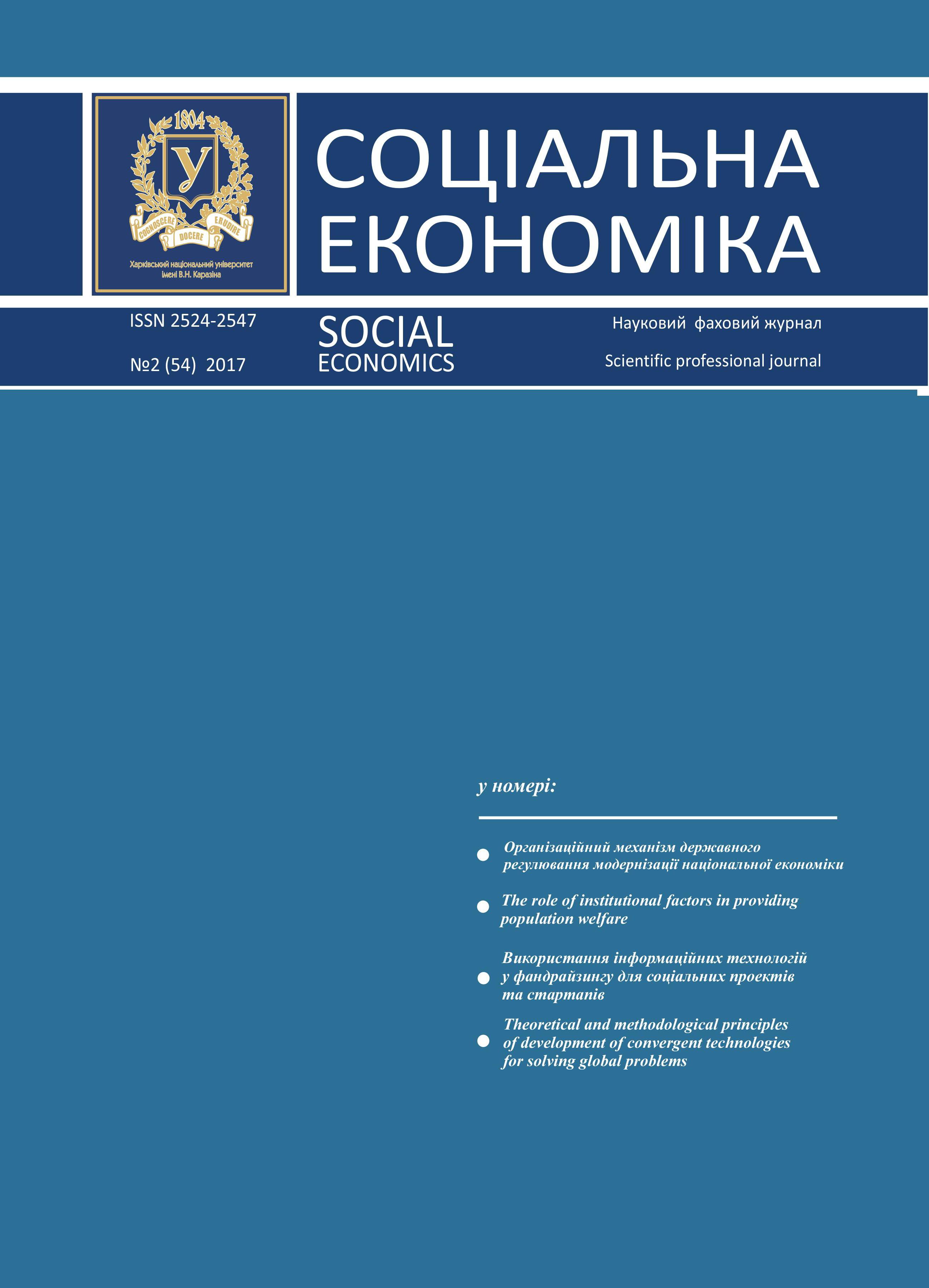APPROACH TO DEVELOPMENT AND IMPLEMENTATION OF SOCIO-ECONOMIC DEVELOPMENT PROJECTS OF TERRITORIAL COMMUNITIES
Abstract
It is established that the work carried out within the framework of U-LEAD, DESPRO, DOBRE Projects and Organizations such as AUC, UADRC and RAUC in the direction of creating financially well-off Communities is not enough. Studies show that, firstly, the level of "own income per capita" does not allow most of the United Territorial Communities to finance Socio-Economic Projects for their own money, and secondly, there are practically no Projects aimed at raising this level, which is the basis of financial solvency (with more than 12.5 thousand Projects registered on the website of the State Regional Development Fund at present, only 6 refer to the section "Social Entrepreneurship and Economic Activity"). This situation is unlikely to improve in the foreseeable future - the number of Unified Communities is growing quite actively - from 159 in 2016 to almost 700 by the end of 2017, and in general as a result of the Decentralization Reform, their number will be measured in thousands. The creation of Project Offices as structural subdivisions of the Regional Development Agency and the introduction into their work of modern "hard" and "soft" Project Management methods, such as the Logical Framework Approach and Agile-management, is an integrated approach to organizational, methodological and technical assistance to the United Territorial Communities in the development and implementation of Socio-Economic Projects. The complex use of "hard" and "soft" Project Management methods will make a closer connection between the stages of the Life Cycle of the Project and the problems of the Life Cycle of its Product, which is especially important in the context of the long-term development of the Region (Territory). They will also allow the United Communities to rely on investors' funds to finance Socio-Economic Projects and obtain a multiplication of their incomes.
Downloads
References
2. Program U-LEAD (2016). The Local Government Reform and the Power decentralization (Official site). Retrieved from http://donors. decentralization.gov.ua/ project/u-lead (in Ukr.).
3. DESPRO: Swiss-Ukrainian project "Decentralization Support in Ukraine" (2013). (Official site). Retrieved from http://despro.org.ua/ (in Ukr.).
4. Program DOBRE (2016). The Local Government Reform and the Power decentralization (Official site). Retrieved from http://donors. decentralization.gov.ua/ project/dobre (in Ukr.).
5. Association of Ukrainian Cities (2002). (Official site). Retrieved from http://2.auc.org.ua/page/tsili-ta-zavdannya (in Ukr.).
6. National association of local authorities "Ukrainian association of district and regional councils" (2011). (Official site). Retrieved from http://uaror.org.ua/ ?page_id=46 (in Ukr.).
7. A new association "The Association of United Territorial Communities" has been set up (2016). Press center of the "Decentralization of Power" initiative. Retrieved from http://decentralization.gov.ua/news/item/ id/3803 (in Ukr.).
8. The first year of success of 159 joint territorial communities "From aspirations to accomplishments" (2017). Retrieved from http://159plus.com/pics/attachments /MinReg_print.pdf (in Ukr.).
9. State Fund of regional development (2017). Ministry of Regional Development, Construction, Housing and Communal Services of Ukraine (Official site). Retrieved from http://dfrr.minregion.gov.ua/Projects-list (in Ukr.).
10. A Guide to the Project Management Body of Knowledge (PMBOK® Guide) (2013). Retrieved from http://kapponerko.ucoz.net/_ld/0/1_P-M-B-o-K-5-Rus.pdf
11. Chemerys, A. (2012). Development and management of projects in the public sphere: the European dimension for Ukraine. Practical manual. Swiss-Ukrainian project "Support of Decentralization in Ukraine - DESPRO". Kyiv : TOV Sofiya-A (in Ukr.), ISBN 978-617-7031-04-7 (in Ukr.).
12. Agile Government Handbook (Official site). Retrieved from http://www.agilegovleaders.org/handbook/
13. Kononenko, I., Lutsenko, S. (2017). Method for selection of project management approach based on fuzzy concepts. Visnyk NTU «KhPI». Seriya: Systemnyy analiz, upravlinnya ta informatsiyni tekhnolohiyi (Bulletin of NTU "KhPI". Series: Strategic management, portfolio, program and project management), 2(1224), 8-17 (in Ukr.), ISSN 2311-4738, doi: 10.20998/2413-3000.2017.1224.2
14. Agile Government: Overcoming Objections, Facing Reality, and Saving Money. Retrieved from https://drive.google.com/file/d/0B4x-JjyOVv3pM1Mxdkprbm MzMzQ/edit
15. Kendall, G., Rollins, S. (2004). Advanced Project Portfolio Management and the PMO Multiplying ROI at Wrap Speed. Moscow : ZAO PMSOFT (in Rus.).
16. The Cabinet of Ministers of Ukraine (2016). Order of February 11, 2016 No. 258. On approval of the Model Provisions on the Agency for Regional Development. Retrieved from http://zakon3.rada.gov.ua/ laws/show/258-2016-%D0%BF/paran8#n8 (in Ukr.).
17. National reforms council (Official site). Retrieved from http://reforms.in.ua/ua/reformy/nacrada (in Ukr.).
18. Lyakh O.V. (2016). Industrial policy under decentralization of public administration: strategy of smart specialisation. Economy of Industry, 2(74), 74-90 (in Rus.). Retrieved from http://nbuv.gov.ua/UJRN/econpr_2016_2_7.
19. National/Regional Research and Innovation Strategies for Smart Specialisation (RIS3 strategies). COHESION POLICY 2014-2020 (2013). Retrieved from http://ec.europa.eu/regional_policy/sources/docgener/informat/2014/smart_ specialisation_en.pdf.




